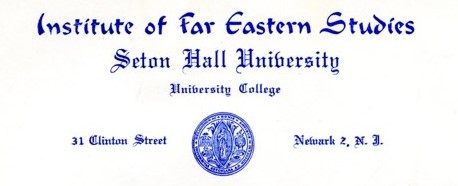From its earliest days, Seton Hall has welcomed international students from locations across the globe. During the post-World War II era, the school made a concerted effort to introduce and promote educational initiatives specifically devoted to the Asian experience. These measures have enhanced the intellectual and interactive opportunities for the benefit of countless Setonians over the past several years.
The formal genesis of a venture into learning more about civilizations across the Pacific Ocean led to the creation of the Far Eastern Institute (now known as the Asia Center) at Seton Hall University on October 29, 1951. This date became a major milestone in school history as Monsignor John McNulty, University President hosted various dignitaries from Japan and the Republics of China (Taiwan), Korea, and Vietnam at the South Orange campus to officially christen the Institute. The basis of this alliance was founded on the principles of offering specialized instruction, promoting scholarship, programming opportunities, and the encouragement of cultural exchange with the faculty, student body, and community at large.
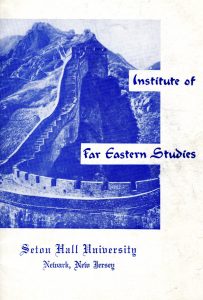
In more formal terms, the principles of this center were outlined in the following manner: “The Institute of Far Eastern Studies was organized to promote better understanding between the American people and the people of the Far East. The academic courses of this Institute will give the student an opportunity to study the cultural, historical, political, economic, religious and social aspects of the Far East. Since the Institute wishes to use every means available to encourage the interchange of Eastern and Western culture, it is engaged in research work, it conducts public lectures and forums, and publishes articles, monographs and books.”
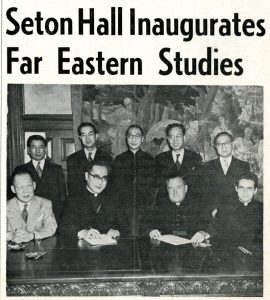
The first advisory board featured a distinguished group of officials who directed the incorporation and implementation of programs ultimately adopted by the Institute. This “regency” of trustees included the following individuals: The Reverend John J. Cain, representative of Seton Hall University and the Archdiocese of Newark; The Most Reverend Paul Yu-Pin, Archbishop (later Cardinal) of Nanking; The Honorable John Chang Nyum, Prime Minister of South Korea; The Honorable Kostaro Tanaka, Chief Justice of Japan, who later became President of Tokyo University; The Honorable Ngo Dinh Diem, former Prime Minister of Việtnam who later became President of the Republic; and Dr. John C.H. Wu, Chinese Jurist and Minister of China to the Holy See who also served as a Professor of Law at the Seton Hall University School of Law.
The first noticeable examples of institutional support came in the form of Seton Hall-endorsed research projects that focused upon various aspects of Chinese socio-political life. The major studies that began this trend included one by the Reverend John Niu, who investigated the cultural and social development of the Industrial Bank of China along with the reorganization of Chinese Economics from a Communistic perspective. In addition, Mr. Yeu Yeu Pan, former Commissioner of Education of Shanghai, conducted research on the principles of democracy as explained by selected ancient Chinese writers representing different centuries and schools of thought.
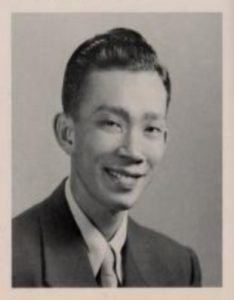
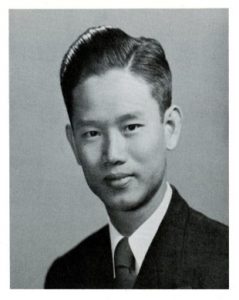
Concurrent with the inauguration of the Institute, the first documented Asian students to graduate from Seton Hall occurred during the early 1950s. Counted among the first alumni were Mr. Ly-Chanh-Du, ’52, a native of Travinh, Việtnam who earned a B.S. in Social Studies while attaining Dean’s List status and participated in the Le Circle Français Society. Mr. Francis P. Sing, ’53 hailed from Sen-Hui, Kit-Yang, Swallow, China, and earned his B.A. in Science and Management.
The creation of a formal and specific Asia-centric curriculum offered through the Institute commenced during the early-mid 1950s and was open to both high school and college students who could register both on a registered or non-matriculated basis. Courses were held at the University College Center campus located at 31 Clinton Street in Newark as part of the greater Seton Hall University Urban Division. Primary class offerings included Culture, History, Philosophy, and Political Science by country (including India and Pakistan) along with elementary through advanced levels of language instruction opportunities in Chinese, Japanese, Korean, and Vietnamese.
In the wake of the growing allure of the Institute, The Reverend R.J. de Jaegher was dispatched by Monsignor McNulty on a goodwill tour of Asia during the late-1950s to meet with various dignitaries to further enhance the program. Counted among his findings included the following highlights . . .
- The University of Viet-Nam is willing to exchange books, professors, etc., with Seton Hall. President Diem would like to have Father de Jaegher back to Vietnam for important work there as soon as possible.
- Chiang Fu-Tsun, Director of the Chinese National Central Library, is a Catholic convert, and he is willing to exchange books with Seton Hall. Recently he has sent some valuable books for the Seton Hall Centennial.
- All the Korean Universities invited me to give lectures and gave me a trunk full of Korean books for our Institute. All those Universities asked for documentation on Seton Hall.
- Bishop Paul Marie Kinam Ro of Seoul (Korea) has a Holy GHOST MEDICAL College, the only Catholic College in Korea, and Bishop Ro requested me to ask you to have his College affiliated with Seton Hall Medical Center.
- Father Willem Grootaers – a professor from the Catholic University of Peiping, a great authority on linguistics . . . after receiving a Doctorate at Seton Hall, could be research professor for Seton Hall in Japan and do some work for Seton Hall free of charge.
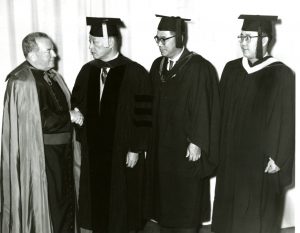
Additional advancements were made as the school continued to thrive into the late 1950s and subsequent decades as Seton Hall University teamed with the United States Department of Education, Health and Welfare to offer scholarships to students who were willing to learn to speak fluent Chinese or Japanese. Along with external support, the administration looked to broaden the program and affiliate it with the Department of Social Studies. This led to other opportunities that would arise in subsequent decades including various research endeavors undertaken by a number of faculty and students, the creation of the Seton Hall University Press which specialized in Chinese language texts, and official student and professor exchanges with individual Chinese colleges and universities among other activities of note.
Additional introductory information on the Institute including faculty and graduates of the school can be found within our online yearbook collection – https://scholarship.shu.edu/yearbooks/
Resources related to the Asian Studies experience are varied https://archivesspace-library.shu.edu/search?utf8=%E2%9C%93&op%5B%5D=&q%5B%5D=Asia&commit=&field%5B%5D=&from_year%5B%5D=&to_year%5B%5D= Additional specific subject areas and topics beyond the 1950s alone including program development, faculty profiles, and other aspects of Asian Studies at Seton Hall can be made accessible upon request.
For more information on our resources and to schedule an appointment please contact via e-mail: archives@shu.edu or by phone at: (973) 275-2378.
Selected Bibliography
Asia Center, 50th Anniversary Program. South Orange, NJ: Seton Hall University, 2002.
Far Eastern Institute Prospectus. South Orange, NJ: Seton Hall University, 1951.
“Far Eastern Institute” Files. Office of the President & Chancellor of Seton Hall University: John L. McNulty records Collection, Identifier: SHU-0003-012
“Seton Hall Inaugurates Far Eastern Studies,” The Setonian, 2 November 1951, Vol. XXVI, No. 6, 1-3.
Seton Hall University Catalog(ue) Bulletin, 1956-57. South Orange, NJ: Seton Hall University, 1956.
